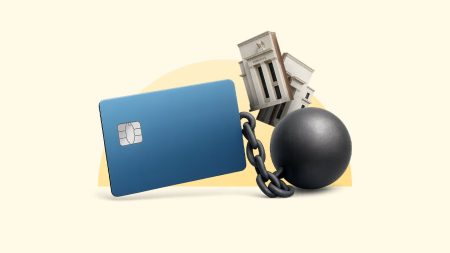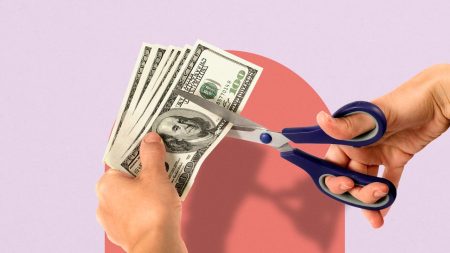Buy a home, they said. Invest in your 401(k), they said. Increase your income, and it will all be fine, they said.
As a millennial in America, I’ve done my best to make the right moves in my career and with my money. I’ve done what they said. So why does it all still feel so hard?
I began my career in personal finance journalism in 2019, and it feels like all we’ve seen in that time is economic uncertainty. COVID. Soaring interest rates and inflation. Home unaffordability and recently the news of tariffs sending the stock market into a plunge. It’s taken a toll, and I can only imagine how challenging it’s been for so many people who face greater financial challenges than me.
Financial anxiety is a common issue, which feels especially obvious when every new headline seems to fuel it. In a recent CNBC poll, 73 percent of respondents said they are “financially stressed,” and 66 percent of that group cited the tariff wars as a main reason.
Unfortunately, financial anxiety is something many people just have to learn to live with. And as my own experience has shown me, that anxiety can still be a challenge even with a relative measure of financial and career success.
For some expert perspective, I recently spoke with Colin Slabach, Ph.D., a certified financial planner and professor at New York University, and Maureen Paley, a financial coach and advisor. Here’s what they had to say about how to cope with financially uncertain times when it comes to both your money and your mental health.
The effects of financial uncertainty
The impact of financial chaos of bad news impacts many people directly, with the potential to have a real and negative influence on mental health..
“The pandemic triggered a brief but severe recession that disrupted jobs and kept people at home, spiking feelings of loneliness, anxiety and depression,” Slabach says. “Then came inflation, which surged, driving up the cost of everyday necessities and finally housing, which became more unaffordable than any other time in U.S. history.”
I’ve felt this myself.
By any measure, I should feel successful. I realize my privilege. I’ve tripled my income since 2019, saved up a healthy emergency fund and got a full 401(k) match with every employer I’ve had. In 2023, I bought a condo at the heart of Seattle — my favorite city. Yet I still feel anxious and tired.
Perhaps it has to do with memories of tougher times I can’t seem to keep in the past: eating ramen when money was tight, dealing with collections when I maxed out my credit card, having no discretionary income whatsoever so I could save at least a little bit of money.
Sure, my income has grown, but so has the cost of living. Consumer prices are 23.3 percent higher than they were in February 2020 when the pandemic started, according to a Bankrate analysis of Bureau of Labor Statistics data. The recent tariff-induced volatility in the stock market was a scary reminder of how quickly things can change.
With all of this, it feels like no matter how well I’m doing, it’s not good enough. Things change too rapidly. Creating a secure financial foundation in a volatile economic climate feels like trying to build a raft in the middle of a storm.
“This cocktail of rising costs of basic necessities, followed by unaffordable houses, and now a volatile stock market has eroded many people’s financial confidence,” Slabach says. “The incessant pressure can lead to significant mental health challenges, including feelings of insecurity, depression, and a pervasive sense of helplessness.”
How can you not feel helpless when the economy seems to be something that happens to you? You can’t control it, and you can’t change it. So, how do you cope?
How to cope with financial uncertainty
When the economic environment has you feeling like your own financial situation is but a house of cards, don’t let yourself think there’s nothing you can do. Perhaps you don’t have much influence on the markets or inflation — but you have all the power when it comes to your personal financial decisions.
Focus on the things you can control
As far as your wallet goes, Paley suggests focusing on things that are in your control.
“While we can’t control the macroeconomic aspects, we can control the microeconomic aspects at home,” she says. “We can make sure we can look at our budgets again. We can pay down high-interest debt as quickly as we can to make sure we’re not burdened with those expenses.”
Slabach also recommends building financial resilience and flexibility: make a budget, create an emergency fund and learn about investing.
“All three are vital for wealth accumulation,” he says.
Educating yourself on stocks can also help with the stock market volatility. You’ll be better equipped to determine how much risk tolerance you have and to set up safeguards before investing.
Take care of yourself
As you’re making yourself feel safer financially, don’t neglect your mental health.
“Make sure you get good nutrition,” Paley says. “Get good sleep again. Focusing on the basics can really go a long way in making sure that you have all of your basic needs met, so that you can ride out the storm.”
Slabach suggests establishing a healthy daily routine, practicing mindfulness and limiting exposure to negative news and social media.
I can’t do the latter — I have to stay in the know for you, my reader — but I can attest to the rest. Earlier in the year, when my anxiety turned into depression, I barely ate, slept or talked to anyone, spending my time scrolling on social media to see what else was going wrong. I still scroll, but I also got back into self-care. I returned to my workout routine, bought multivitamins and started making at-home spa days. I reconnected with my friend group. It has made all the difference.
“You might also want to try something new that you haven’t tried before,” Paley says. “Maybe now is the time to try stress-reducing practices, meditation, yoga. Maybe now is the time to join a support group or start a support group with people who you know are going through the same things.”
Note that none of this is a substitute for clinical support. If you’re struggling with mental health, and nothing seems to work, consider seeking professional help.
Be OK with uncertainty
Under the constant barrage of news, things might seem especially volatile. But in truth, are they ever certain?
“The uncertainty right now feels pretty intense,” Paley says. “In a lot of respects, uncertainty is always going on in the background… and it’ll keep going.”
As you’re making your own financial situation as secure as you can and practicing self-care, practice being OK with uncertainty, too. Pretend it’s a muscle you can train.
Maybe you are in the middle of a storm on a raft, but it’s a raft you’ve built, and it has gotten you through so much already. It must be an excellent raft, so give yourself some credit. And if another storm hits, you can do it again.
The bottom line
If you’re stressed because of money, know that you’re not alone — most people are. The economic turbulence we’ve seen in recent years has surely left its mark. And all the news we see today isn’t helping either. It reports on trends that have a very real impact on our lives, after all.
Most likely, there’s very little you and I can do about that. But we can take care of ourselves. We can reinforce our financial foundations and make sure our needs are met, both physical and emotional.
There’s been a lot of chaos, and there will be more. The economy is a storm that ebbs and flows, but it’s one you can weather.
Read the full article here











